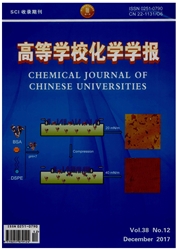

 中文摘要:
中文摘要:
以聚丁二酸丁二醇酯(PBS)为参照,研究了酯酶Lipase AY30对亲水磷酰胆碱(PC)基团改性的聚丁二酸丁二醇酯(PBS-PC)的生物降解性能的影响.结果显示,在酯酶Lipase AY30作用下,21 d后PBS的质量损失仅为1.9%,而PBS-PC的质量损失了9.7%.相同条件下扣除各自水解引起的质量损失(PBS 1.4%和PBS-PC 6.5%)后,PC亲水基团的引入对聚合物的降解起到了促进作用.示差扫描量热(DSC)研究结果表明,改性后的聚合物熔融温度和熔融焓降低,玻璃化转变温度升高,表明PC端基的引入降低了PBS的结晶能力,非晶相结构的增多对聚合物降解有促进作用.因此PBS-PC有望作为一种新的具有良好生物降解性和生物相容性的高分子材料,应用于药物控释、基因治疗及组织工程等生物医用材料领域.
 英文摘要:
英文摘要:
Enzymatic degradation of poly(butylene succinate)(PBS) and phosphorylcholine functionalized poly(butylene succinate)(PBS-PC) were performed in the presence of lipase AY30.It was found that PBS-PC was effectively biodegraded by lipase AY30,and PBS was hardly degraded even after an experimental time scale of 21 d.By means of differential scanning calorimetry(DSC),thermal properties of PBS and PBS-PC were studied.The results show that the melting point(Tm) of PBS-PC is decreased and glass transition tempe-rature(Tg) is increased compared with unmodified PBS.PBS-PC may have potential applications in biological environments as new carriers for controlled drug release,gene therapy,and scaffold for tissue engineering systems.
 同期刊论文项目
同期刊论文项目
 同项目期刊论文
同项目期刊论文
 Synthesis and characterization of sulfonated poly(butylene succinate) nanomicelles for drug delivery
Synthesis and characterization of sulfonated poly(butylene succinate) nanomicelles for drug delivery Photoresponsive side-chain liquid crystalline polymers with amide group-substituted azobenzene mesog
Photoresponsive side-chain liquid crystalline polymers with amide group-substituted azobenzene mesog Azobenzene-containing molecularly imprinted polymer microspheres with photoresponsive template bindi
Azobenzene-containing molecularly imprinted polymer microspheres with photoresponsive template bindi 期刊信息
期刊信息
